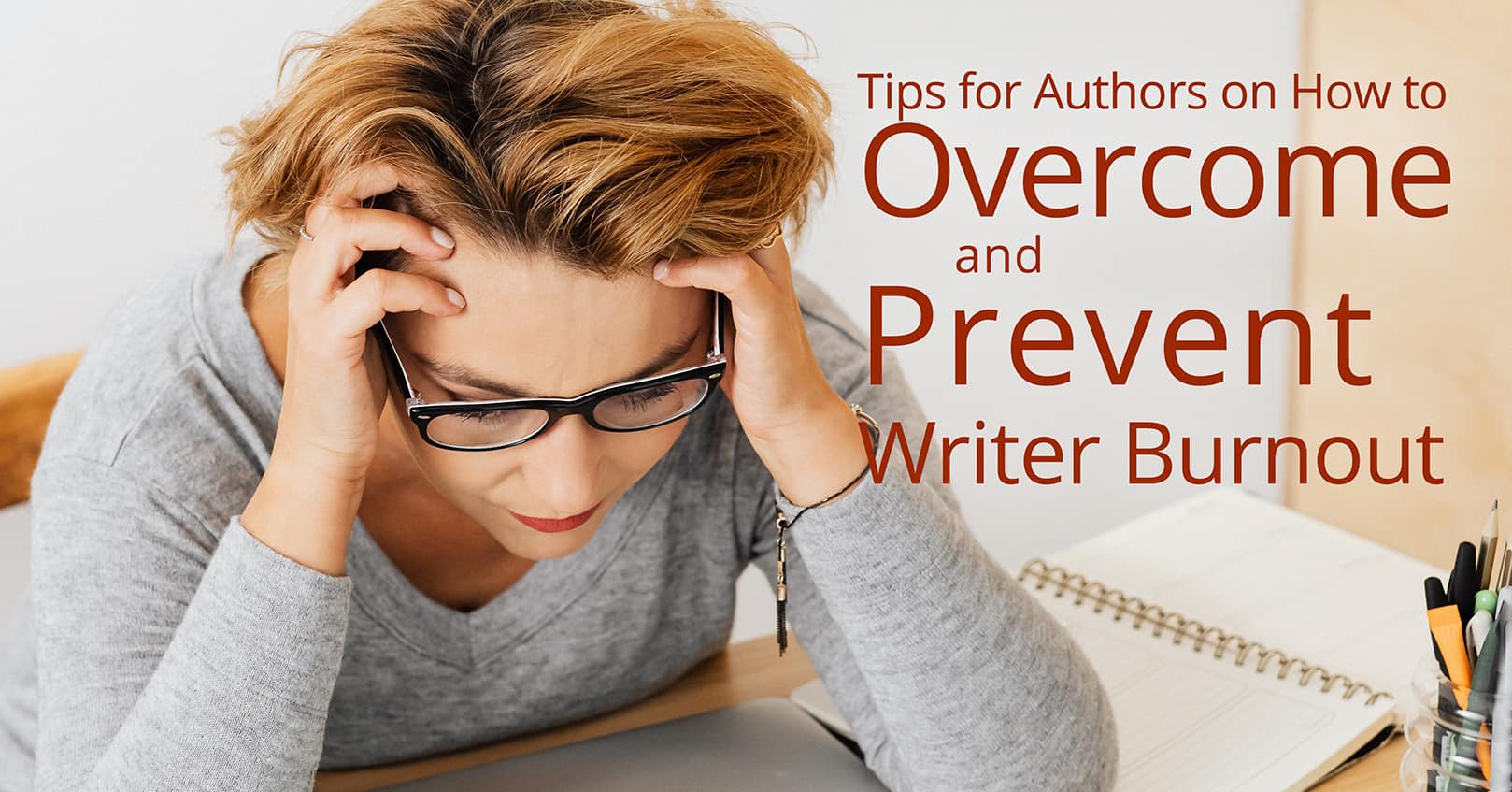
Are you mentally exhausted and overwhelmed? Do you have to force yourself to get to the computer and write? You may be experiencing burnout. Here are tips for authors on how to overcome burnout, as well as prevent it from happening again.
Let’s first look at the symptoms of burnout:
Symptoms of Writer Burnout
- Lack of motivation to write
- Feeling hopeless
- Depression
- Feeling moody
- Anxiety or tenseness
- Headaches
- Feeling exhausted even after sleeping
- Procrastination
- Thinking about everything you have to do even when you should be relaxing
Do any of these sound familiar? So how do you overcome these symptoms? Let’s dive in!.
How to Recover from Burnout
1. Focus on Your “Why”
Why are you writing? Is it for pleasure? For work? What made you choose writing? Why are you writing in that genre? What made you want to write the book you’re writing? Clarifying your why can help you get refocused on what is really important and overcome that writer burnout.
2. Get Enough Quality Sleep
Are you getting 7–8 hours of sleep a night? If you aren’t, examine your schedule and adjust so you can get that sleep. You’ll likely find that once you’re getting enough sleep, you’re able to be more productive during the day, so you won’t need to stay up later to get things done.
Many people also stay up late to unwind by watching TV, which not only lessens the amount of sleep you get, but also exposes your eyes to blue light, throwing off your circadian rhythm and lowering your quality of sleep.
Another question to consider: Are you going to bed before midnight? Some research shows that while REM sleep is important, non-REM sleep is deeper and more restorative—and there is a higher ratio of non-REM sleep earlier in the night, regardless of when you go to bed. In other words, if you go to bed after midnight, you’re missing out on a large portion of restorative, non-REM sleep. The best time to go to bed varies among individuals, but generally it should fall between 8 p.m. and midnight.
You can read more tips about getting high-quality sleep to overcome burnout here.
3. Take a Physical Break
Take a couple days to relax and recharge yourself. You could take a vacation, spend extra time with family or friends, or do something fun but creative, like going to a museum or a play. Give your creative muscle—your brain—some time to recover. But don’t take too long of a break; once you have relaxed for a few days, it’s time to get back to work.
If you don’t have time to take a few days off, then try doing a mini vacation night at home with the help of your spouse and kids. Ask them to make dinner and clean up while you relax. Read a book, take a bath, give yourself a pedicure. Don’t worry about the dirty dishes or the messy front room; just take some time for yourself.
4. Take a Genre/Series Break
You may just need to take a break from the book, series, or genre that you’re writing. Try writing something else for a couple days to recharge yourself. Free writing or writing a short story is a great way to take a quick break; if the end result is good, you can even offer the story as a freebie to subscribers of your author newsletter.
How to Prevent Burnout
Now, let’s look at ways you can prevent burnout from happening in the first place.
1. Time Block and Set a Writing Schedule
Time block your day by setting aside blocks of time to accomplish tasks on your to-do list. This includes everyday tasks as well as writing tasks. You can time block on a digital calendar, but many people find time blocking on a paper planner more helpful.
However you time block, keep your writing blocks of time consistent throughout the week; having this time scheduled at a consistent time preps your brain to be creative so you won’t overload it suffer from burnout. Depending on your other responsibilities, you may work every day (but one—see tip #3), or you may work three or four times a week; you may have an 8-hour workday, or you may work just a few hours a day. Whatever time commitment you can make, keep it consistent—a consistent time of day and consistent days of the week.
Time blocking is a great way to get the important things done and make your writing automatic.
2. Set Boundaries and Say No
It’s easy to become burned out when your schedule is too full. We often pack our schedules with things that aren’t necessary in an effort to be kind and be liked. In fact, many people are people-pleasers without even realizing it.
Do you say yes to requests from family and friends even if you don’t have enough time to complete the request, or really don’t want to do it? Are you worried about how people see you and want to be liked by everyone? Do you avoid telling people when you’re hurt or offended? Do you tend to agree with people rather than offering a contrary opinion? You may be a people pleaser. In her book, 13 Things Mentally Strong People Don’t Do, Amy Morin says people pleasing actually damages relationships and causes people to lose sight of their values.
Instead of being a people pleaser, learn to say no. If you don’t have time to do something, say no. If you dread doing something someone requests of you, say no. This doesn’t mean you don’t serve others; this means you offer service when you have time and when it won’t be done grudgingly. Every time you have a request, evaluate it. Ask, “What will I have to give up to do this?” And, “Does this help me live my values?” If your values include your writing and your family, then agreeing to do something for someone during your writing time takes away from your value of writing.
You may find that many of the requests people make of you aren’t really that important to them; they’re only asking because you seem to always have the time to help. They may also not realize that you don’t have the time to complete their requests and are completely fine with you saying no.
Saying no goes hand-in-hand with setting boundaries. Tell people your writing hours and expect them to respect them. If someone asks you to do something when you should be writing, or calls you up to chat, tell them you’d love to talk to them later, but right now you are working and must go. Be firm but kind and they will respect your time.
3. Take Breaks
Take short breaks throughout the workday to recharge your mind and prevent burnout. The Pomodoro method is a great technique for breaks.
Take a day off every week to relax and spend time with family instead. Don’t do any work at all—not even answering emails. You’ll find that taking a day off weekly allows your body and mind to recuperate from the busy week. Your brain is a muscle that needs to be rested, so give it that rest! Dr. Matthew Sleeth talks about the great benefits of taking a day off work in his book 24/6: A Prescription for a Healthier, Happier Life. He concludes that when people take a day off each week, they actually get more done than those who don’t take a day off.
And finally, take a yearly vacation. This is especially important for writers, who get their inspiration from the world around them. A vacation is a great way to prevent burnout and get inspiration for your next book.
4. Eat Healthy and Exercise
We all know we should be eating healthy and exercising, but actually doing so is difficult! But being healthy is the best way to keep your mind sharp and clear and your energy high.
You can start small by not buying junk food like chips and cookies that are easy to snack on. Preparing healthy snacks at the beginning of the week is also a great way to keep yourself eating healthy. If you are deficient in vitamins (a blood test at your yearly wellness check can confirm), then take a quality multivitamin daily, based on your doctor’s recommendations.
As for exercising, start with doing ten minutes of exercise in the morning, like yoga, dance, Zumba, or even simply stretching.
You can check out more tips on how writers can be healthy here.
5. Cut out Negative
It’s hard to be positive and motivated to write if you’re surrounded by negative. Limit time with friends and extended family members who are negative, whether their negativity is about some aspect of your writing career, or they are just generally negative and complaining. If you can’t limit time with a negative person, ask them to help you stay positive by making an effort to be more positive themselves and not complain. The person may not even realize that they’re often negative.
In this same vein, prevent burnout by striving to be a positive person yourself. When you want to complain, instead find something positive to say about the situation. Also be positive about yourself and your motivation. Don’t say “I can’t,” “I don’t want to,” “I don’t feel like” about your writing. Instead say “I can,” “I want to,” and “I will.” Saying something negative only reinforces the negative and makes you feel worse, so don’t do it!
How do you overcome or prevent writer burnout? Let us know in the comments below! For an author’s personal writer burnout story and the little lie she tells herself, click here.













Comments